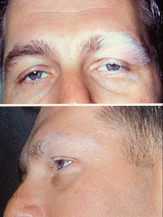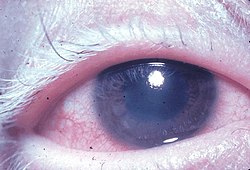Vogt–Koyanagi–Harada disease
(Redirected from Vogt-Koyanagi-Harada disease)
Autoimmune multisystem inflammatory disorder affecting eyes, ears, skin, and CNS
| Vogt–Koyanagi–Harada disease | |
|---|---|

| |
| Synonyms | Vogt–Koyanagi–Harada syndrome, uveomeningitis syndrome, uveomeningoencephalitic syndrome |
| Pronounce | |
| Field | Ophthalmology, Neurology, Dermatology, Immunology |
| Symptoms | Eye pain, redness, vision loss, tinnitus, vertigo, headache, meningismus, skin depigmentation, hair whitening |
| Complications | Permanent vision loss, hearing impairment, chronic uveitis |
| Onset | Young to middle-aged adults (20–50 years) |
| Duration | Chronic, recurrent |
| Types | Complete, incomplete, probable VKH |
| Causes | Autoimmune response targeting melanocytes |
| Risks | Genetic predisposition (HLA-DR4), ethnicity (Asian, Hispanic, Native American descent) |
| Diagnosis | Clinical evaluation, fluorescein angiography, lumbar puncture, imaging studies |
| Differential diagnosis | Sympathetic ophthalmia, sarcoidosis, systemic lupus erythematosus, multiple sclerosis |
| Prevention | None known |
| Treatment | Corticosteroids, immunosuppressants, biologics |
| Medication | Prednisone, azathioprine, cyclosporine, infliximab |
| Prognosis | Generally good with prompt treatment; delayed treatment may result in severe vision impairment |
| Frequency | Rare |
| Deaths | Rare |
Vogt–Koyanagi–Harada disease (VKH disease) is a multisystem, chronic inflammatory disorder of presumed autoimmune origin, primarily affecting tissues containing melanin, particularly the eyes, ears, skin, and central nervous system. The disease is characterized by bilateral diffuse uveitis, neurologic involvement, auditory disturbances, and dermatological manifestations, such as vitiligo, poliosis, and alopecia.
Signs and symptoms
VKH disease progresses through four clinical phases, each marked by distinctive symptoms:
Prodromal phase
This initial phase typically lasts a few days and often resembles a viral illness, characterized by:
- Fever
- Headache
- Meningismus (neck stiffness, photophobia, headache)
- Auditory symptoms (tinnitus, vertigo, hypoacusis)
- Sensitivity of hair and skin to touch
- Orbital pain, photophobia, excessive tearing
Acute uveitic phase
This phase occurs shortly after the prodromal period and lasts several weeks, characterized primarily by severe bilateral uveitis:
- Eye redness and pain
- Sudden vision loss or blurred vision
- Anterior chamber inflammation
- Optic disc edema
- Serous retinal detachment
Convalescent phase
During this stage, inflammation subsides but skin and hair changes become evident:
- Vitiligo (especially in the sacral region)
- Poliosis (white patches of hair, notably eyelashes)
- Alopecia (hair loss)
- Improvement of visual acuity, though residual damage can remain
Chronic recurrent phase
Intermittent episodes of uveitis recur months to years later, which can result in:
- Permanent visual impairment or blindness
- Chronic inflammation requiring ongoing immunosuppressive therapy
Causes
VKH disease is presumed to be an autoimmune response against melanocyte-associated antigens. Melanocytes, which produce the pigment melanin, are targeted, leading to inflammation and destruction of pigmented tissues in eyes, skin, and auditory structures.
Risk factors
The following increase susceptibility to VKH disease:
- Ethnicity: More common in Asian, Hispanic, Native American, and Middle Eastern populations
- Genetic predisposition, particularly association with the HLA-DR4 allele
- Age and gender: Commonly affects young to middle-aged adults (20–50 years), more frequently in females
Pathophysiology
Autoimmune inflammation targets melanocyte-containing tissues, leading to granulomatous inflammation. In the eyes, this leads to severe uveitis, retinal detachment, and possible vision loss. Similar inflammatory processes affect the meninges, inner ear, and skin, causing characteristic symptoms across multiple organ systems.
Diagnosis
Diagnosis of VKH is clinical, based on symptoms and exclusion of other diseases, supported by:
- Ophthalmic examination, including fluorescein angiography
- Lumbar puncture showing CSF pleocytosis
- Imaging (MRI) to exclude other neurologic disorders
- Audiometric testing for hearing abnormalities
The diagnosis is classified as complete, incomplete, or probable VKH based on specific clinical and laboratory criteria.
Differential diagnosis
Conditions considered during differential diagnosis include:
- Sympathetic ophthalmia
- Sarcoidosis
- Systemic lupus erythematosus (SLE)
- Multiple sclerosis
- Acute disseminated encephalomyelitis (ADEM)
Treatment
Early diagnosis and aggressive treatment improve prognosis significantly. Treatment focuses on controlling inflammation and preventing permanent organ damage:
- High-dose corticosteroids (oral prednisone or intravenous methylprednisolone)
- Immunosuppressive agents (azathioprine, cyclosporine, methotrexate)
- Biological agents (e.g., infliximab) for refractory cases
- Regular follow-up to monitor ocular inflammation and disease recurrence
Complications
Potential complications of VKH disease include:
- Chronic uveitis leading to cataracts, glaucoma, and vision loss
- Permanent hearing impairment
- Neurological deficits or cognitive impairment due to chronic CNS inflammation
Prognosis
The prognosis for VKH disease is generally favorable with prompt initiation and adequate duration of immunosuppressive therapy. Delayed diagnosis or inadequate treatment increases the risk of permanent visual impairment and hearing loss. Lifelong monitoring and management are typically required.
Epidemiology
VKH disease is considered rare globally, though prevalence varies significantly by ethnicity. It is more common among populations with increased melanin content, including Asian, Hispanic, Native American, and Middle Eastern communities. Women are affected more frequently than men, with peak onset occurring between ages 20 and 50.
History
VKH disease is named after ophthalmologists who described the condition independently:
- Alfred Vogt (Swiss, 1906) described anterior uveitis and depigmentation.
- Yoshizo Koyanagi (Japanese, 1929) reported similar ocular and dermatologic symptoms.
- Einosuke Harada (Japanese, 1926) described the neurologic and audiological manifestations.
Research
Current research is exploring:
- Genetic susceptibility factors and biomarkers for early diagnosis
- Mechanisms of autoimmune response against melanocytes
- Improved therapeutic approaches using biologic agents and targeted immunotherapies
See also
External links
| Hypersensitivity and autoimmune diseases (279.5–6) | ||||||||||||||||
|---|---|---|---|---|---|---|---|---|---|---|---|---|---|---|---|---|
|
Transform your life with W8MD's budget GLP-1 injections from $125.
W8MD offers a medical weight loss program to lose weight in Philadelphia. Our physician-supervised medical weight loss provides:
- Most insurances accepted or discounted self-pay rates. We will obtain insurance prior authorizations if needed.
- Generic GLP1 weight loss injections from $125 for the starting dose.
- Also offer prescription weight loss medications including Phentermine, Qsymia, Diethylpropion, Contrave etc.
NYC weight loss doctor appointments
Start your NYC weight loss journey today at our NYC medical weight loss and Philadelphia medical weight loss clinics.
- Call 718-946-5500 to lose weight in NYC or for medical weight loss in Philadelphia 215-676-2334.
- Tags:NYC medical weight loss, Philadelphia lose weight Zepbound NYC, Budget GLP1 weight loss injections, Wegovy Philadelphia, Wegovy NYC, Philadelphia medical weight loss, Brookly weight loss and Wegovy NYC
|
WikiMD's Wellness Encyclopedia |
| Let Food Be Thy Medicine Medicine Thy Food - Hippocrates |
Medical Disclaimer: WikiMD is not a substitute for professional medical advice. The information on WikiMD is provided as an information resource only, may be incorrect, outdated or misleading, and is not to be used or relied on for any diagnostic or treatment purposes. Please consult your health care provider before making any healthcare decisions or for guidance about a specific medical condition. WikiMD expressly disclaims responsibility, and shall have no liability, for any damages, loss, injury, or liability whatsoever suffered as a result of your reliance on the information contained in this site. By visiting this site you agree to the foregoing terms and conditions, which may from time to time be changed or supplemented by WikiMD. If you do not agree to the foregoing terms and conditions, you should not enter or use this site. See full disclaimer.
Credits:Most images are courtesy of Wikimedia commons, and templates, categories Wikipedia, licensed under CC BY SA or similar.
Contributors: Prab R. Tumpati, MD

